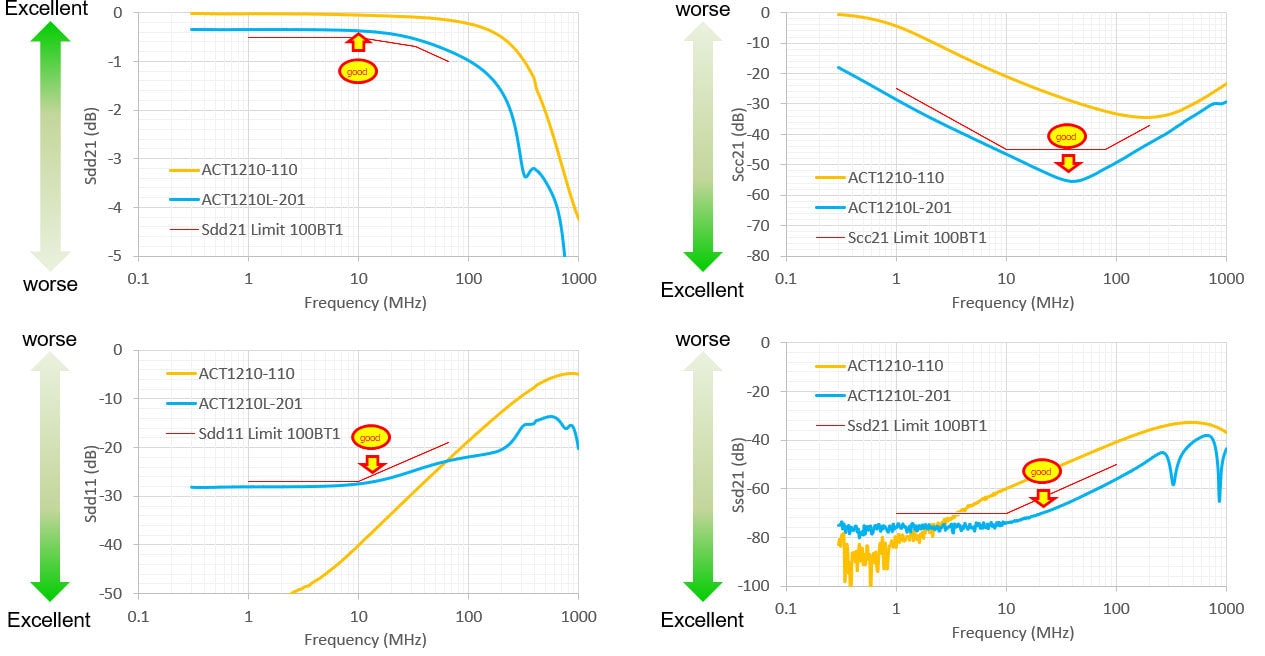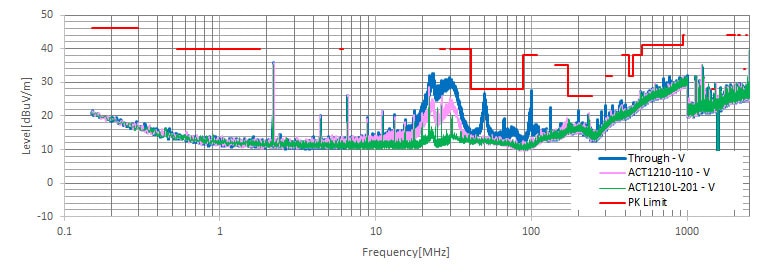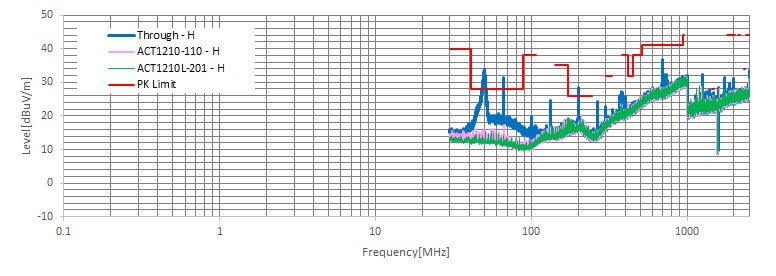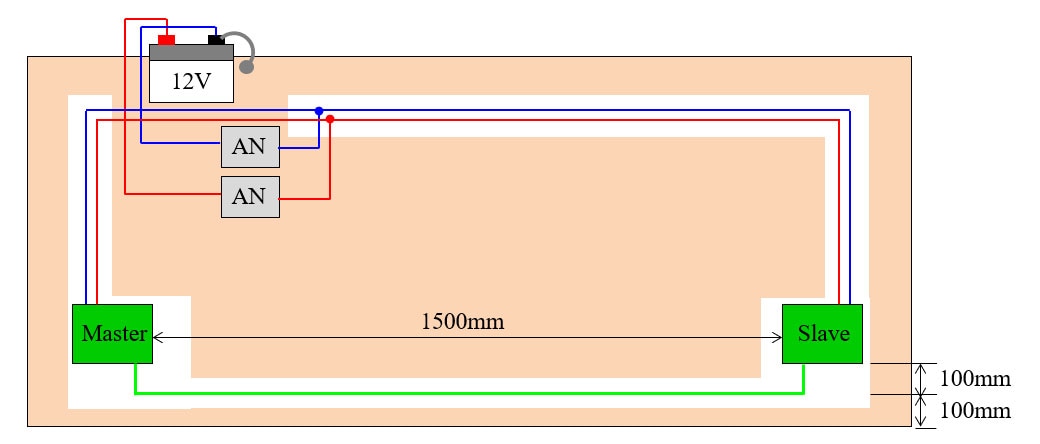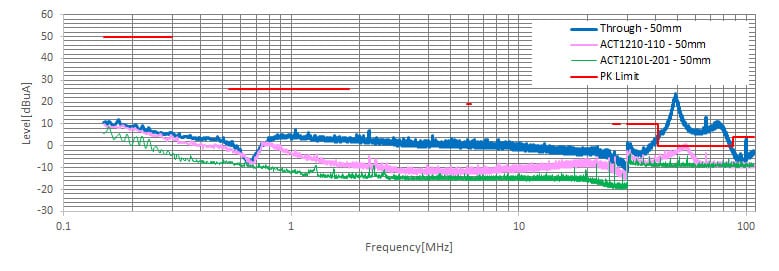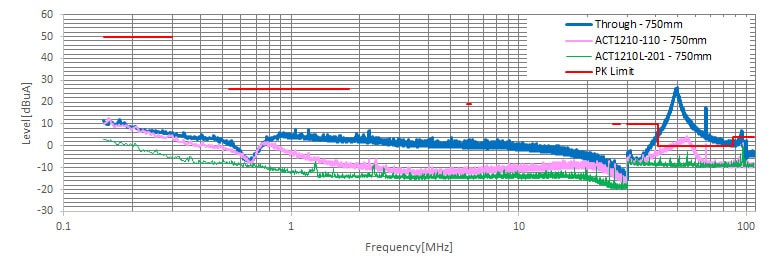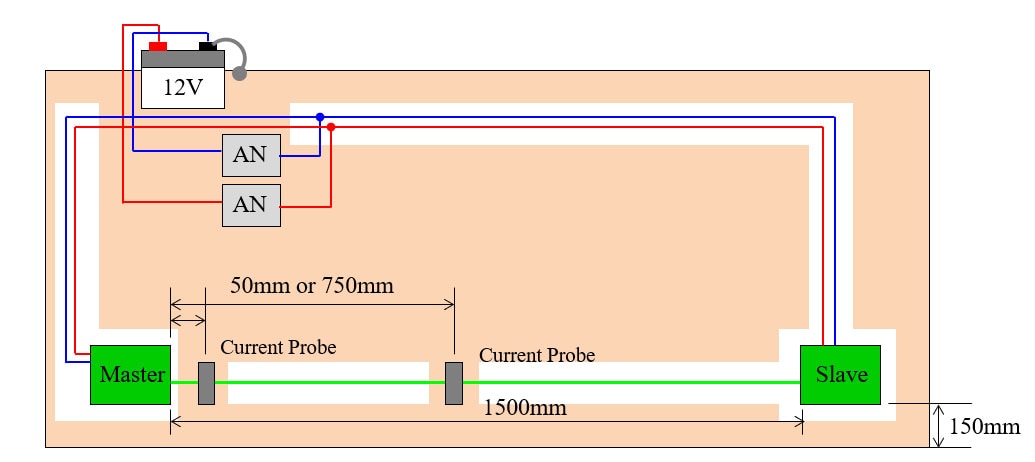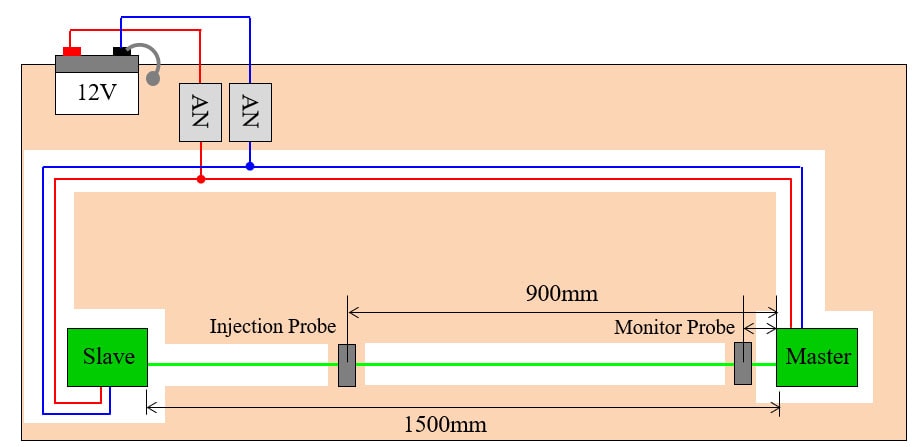Automotive Ethernet: 100BASE-T1 EMC Countermeasures and Common-Mode Filters/Chokes

Contents
Automotive Ethernet
The OPEN (One-Pair Ether-Net) Alliance Special Interest Group (SIG) recommends the 100BASE-T1 and 1000BASE-T1 standards for automotive Ethernet. In this document, we present radiated EMI, conducted EMI, and BCI results for the ACT1210L-201, which complies with the OPEN Alliance 100BASE-T1 standards, and the ACT1210-110, which does not comply with those standards, common mode filters/chokes.
Comparison of S Parameter
"Figure 1 shows a comparison of the ACT1210-110 common mode filter/choke for CAN-BUS use with the ACT1210L-201 common mode filter/choke for automotive Ethernet use as an example.
It can be seen that compared to the ACT1210L-201 common mode filter/choke for automotive Ethernet use, the ACT1210-110 common mode filter/choke for CAN-BUS use cannot satisfy the OPEN Alliance standards."
Comparison of Radiated EMI
Noise suppression effects can be achieved by using a common mode filter/choke. In particular, the effect of attenuating the portion that exceeds the standard line at 30 MHz and higher to near the noise floor can be obtained. (Figure 2) The ACT1210L-201 common mode filter/choke for automotive Ethernet use has a greater noise suppression effects than the ACT1210-110 common mode filter/choke for CAN-BUS use around the range of 10 Hz to 40 MHz.
Emission Test for 100BASE-T1 (Automotive Ethernet)
- Setup
- Status
- ・Class: CISPR25 Ed3 class 5
- ・Test site: Anechoic chamber (3m)
- ・DUT: 100BASE-T1 EVB
- ・Cable length: 1.5 m
Comparison of Conducted EMI
"Noise suppression effects can be achieved by using a common mode filter/choke. In particular, noise Is suppressed in the portion over the standard around the range of 40 Hz to 90 MHz. (Figure 3)
In the range of 150 kHz to 70 MHz, the ACT1210L-201 common mode filter/choke for automotive Ethernet demonstrates greater noise suppression effects."
- Setup
- Status
- ・Class: CISPR25 Ed3 class 5
- ・Test site: Anechoic chamber (3m)
- ・DUT: 100BASE-T1 EVB
- ・Cable length: 1.5 m
Comparison of BCI Results
- Setup
- Status
- ・Frequency: 1 - 400 MHz (CW)
- ・Injection Current: 200 mA (closed-loop method)
- ・Decision: CRC Error
- ・Test site: Shield room
| Frequency MHz | Through | ACT1210-110 | ACT1210L-201 |
|---|---|---|---|
| 1.00 | Fail | Fail | Pass |
| 1.20 | Fail | Fail | Pass |
| 1.44 | Fail | Fail | Pass |
| 1.73 | Fail | Fail | Pass |
| 2.07 | Fail | Fail | Pass |
| 2.49 | Fail | Fail | Pass |
| 2.99 | Fail | Fail | Pass |
| 3.58 | Fail | Fail | Pass |
| 4.30 | Fail | Fail | Pass |
| 5.16 | Fail | Fail | Pass |
| 6.19 | Fail | Fail | Pass |
| 7.43 | Fail | Fail | Pass |
| 8.92 | Fail | Fail | Pass |
| 10.70 | Fail | Fail | Pass |
| 12.84 | Fail | Fail | Pass |
| 15.41 | Fail | Fail | Pass |
| 18.49 | Fail | Fail | Pass |
| 20.00 | Fail | Fail | Pass |
| 21.00 | Fail | Pass | Pass |
| 22.05 | Fail | Pass | Pass |
| 23.15 | Fail | Pass | Pass |
| 24.31 | Fail | Pass | Pass |
| 25.53 | Fail | Pass | Pass |
| 26.80 | Fail | Pass | Pass |
| 27.00 | Fail | Pass | Pass |
| 28.14 | Fail | Pass | Pass |
| 29.55 | Pass | Pass | Pass |
| 31.03 | Fail | Pass | Pass |
| 32.58 | Fail | Pass | Pass |
| 34.21 | Fail | Pass | Pass |
| Frequency MHz | Through | ACT1210-110 | ACT1210L-201 |
|---|---|---|---|
| 35.92 | Fail | Pass | Pass |
| 37.71 | Fail | Pass | Pass |
| 39.60 | Fail | Pass | Pass |
| 41.58 | Fail | Pass | Pass |
| 43.66 | Fail | Pass | Pass |
| 45.00 | Fail | Pass | Pass |
| 45.84 | Fail | Pass | Pass |
| 48.13 | Fail | Pass | Pass |
| 50.54 | Fail | Fail | Pass |
| 53.07 | Fail | Fail | Pass |
| 55.72 | Fail | Pass | Pass |
| 58.51 | Fail | Fail | Pass |
| 61.43 | Fail | Pass | Pass |
| 64.50 | Fail | Pass | Pass |
| 67.73 | Fail | Pass | Pass |
| 69.81 | Fail | Pass | Pass |
| 71.11 | Fail | Pass | Pass |
| 74.67 | Fail | Pass | Pass |
| 78.40 | Fail | Pass | Pass |
| 82.32 | Fail | Pass | Pass |
| 86.44 | Fail | Pass | Pass |
| 90.00 | Fail | Pass | Pass |
| 90.76 | Fail | Pass | Pass |
| 95.30 | Fail | Pass | Pass |
| 100.06 | Fail | Pass | Pass |
| 105.07 | Fail | Pass | Pass |
| 110.32 | Fail | Pass | Pass |
| 115.84 | Fail | Pass | Pass |
| 120.00 | Fail | Pass | Pass |
| 121.63 | Fail | Pass | Pass |
| Frequency MHz | Through | ACT1210-110 | ACT1210L-201 |
|---|---|---|---|
| 127.71 | Fail | Pass | Pass |
| 134.10 | Fail | Pass | Pass |
| 140.80 | Fail | Pass | Pass |
| 147.84 | Fail | Pass | Pass |
| 155.23 | Fail | Pass | Pass |
| 162.99 | Fail | Pass | Pass |
| 171.14 | Fail | Pass | Pass |
| 179.70 | Fail | Pass | Pass |
| 188.69 | Fail | Pass | Pass |
| 190.00 | Fail | Pass | Pass |
| 198.12 | Fail | Pass | Pass |
| 198.12 | Fail | Pass | Pass |
| 208.03 | Fail | Pass | Pass |
| 218.43 | Fail | Pass | Pass |
| 229.35 | Fail | Pass | Pass |
| 240.82 | Fail | Pass | Pass |
| 252.86 | Fail | Pass | Pass |
| 265.50 | Fail | Pass | Pass |
| 278.77 | Fail | Pass | Pass |
| 280.00 | Fail | Pass | Pass |
| 292.71 | Fail | Pass | Pass |
| 307.35 | Fail | Pass | Pass |
| 322.72 | Fail | Pass | Pass |
| 338.85 | Fail | Pass | Pass |
| 355.79 | Fail | Pass | Pass |
| 373.58 | Fail | Pass | Pass |
| 380.00 | Fail | Pass | Pass |
| 392.26 | Fail | Pass | Pass |
| 400.00 | Pass | Pass | Pass |
TDK's Common Mode Filters/Chokes Compatible with Automotive Ethernet
As automotive common mode filters/chokes compatible with automotive Ethernet, TDK has common mode filters/chokes for 100BASE-T1 and 1000BASE-T1 use compliant the OPEN Alliance standards.
| Compliant Standard | Product Name |
|---|---|
| 100BASE-T1 | ACT1210L-201-2P-TL00 |
| 1000BASE-T1 | ACT1210G-800-2P-TL10 |
Summary
"As can be seen from the EMC measurement results, common mode filters/chokes that are not designed for automotive Ethernet have poor EMI noise suppression and BCI immunity. As a result, if a common mode filter/choke that does not pass the OPEN Alliance standard is used, noise may be radiated and interfere with radio and so on, which may have an impact on other communications. In addition, the Sdd21 characteristic of the S parameter has a waveform quality, the Scc21 characteristic has an EMC suppression effect, and the Ssd21 (DCMR) characteristic is a parameter that affects BCI resistance.
Therefore, in conjunction with increases in automotive network communication speeds, signal quality and EMC countermeasures have become more important, and as a result, it is necessary to select common mode filters/chokes that are compatible with DCMR (Ssd21), Which is a mode conversion characteristic, while ensuring a high inductance value that complies with S parameter standards such as the OPEN Alliance standards."

